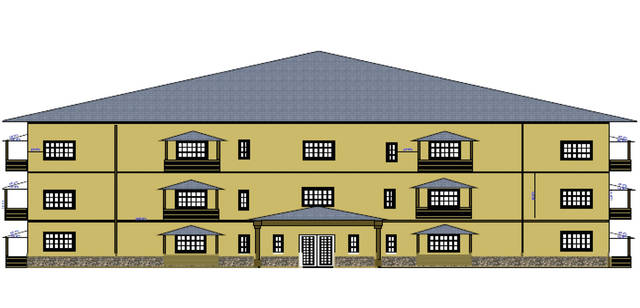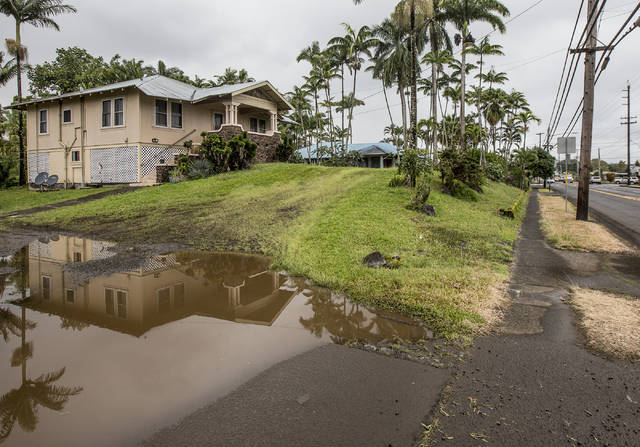Affordable senior housing project would fill critical need


A Hilo developer is hoping to build a new housing project for a vastly underserved demographic: low-income seniors.
A Hilo developer is hoping to build a new housing project for a vastly underserved demographic: low-income seniors.
Hale Kupuna I is being developed by Hilo real estate agent Hank Correa and, if built, it will help alleviate the county’s lack of senior-friendly low-income housing projects.
ADVERTISING
Independent development administrator Chuck Barker said senior-friendly housing is in woefully short supply throughout the state, and the projects that exist are often at a higher price range than many can afford. He called the rush of baby boomers looking for housing a “silver tsunami” that requires immediate action.
“It’s an embarrassment to our society,” Barker said of the lack of affordable senior housing options. “The Low-Income (Housing) Tax Credit program is pretty much the only way they ever get built because it’s more profitable to sell expensive housing.”
In Hilo, there are four apartment complexes for low-income seniors that together offer 188 units. There are no vacancies at any of the complexes and all have waiting lists, some of which are more than 400 names long, according to a market study for the Hale Kupuna project. The same market study estimates that about 833 low-income housing units for residents older than 55 will be required by 2020.
“While roughly 15 million older adults earned less than 80 percent of their area median incomes in 2015, by 2035 this group will reach 27 million,” reads the market study. “Unquestionably, statistical, demographic and even general local housing knowledge is indicative that demand far outstrips available housing supply in the senior low-income housing sector.”
To that end, Correa is awaiting funding approval for a three-story, 36-unit housing complex intended for residents age 62 or older. It would be located one block from the Kamana Senior Center.
The project, Correa said, is one he has wanted to do for years as demand for such a facility has only increased with time.
The facility would feature amenities such as automated electric doors for wheelchair or walker access, mobility scooter charging stations, medical alert wiring in every unit, as well as recreation spaces, a swimming pool and full kitchen facilities in every unit.
“The goal is to produce a place where we’d want our own auntie or grandma to live,” Barker said.
Of the 36 units in the facility, four units would be reserved for seniors who make 30 percent or less of $63,300 per year, which is the Area Median Gross Income. Four others would house seniors making 50 percent or less of the AMGI, while the remaining 28 units would be for those who make 60 percent or less.
“We’re not going to have a problem with putting together a waiting list,” Correa said. “I know there’s already a huge demand for this sort of thing.”
Currently, Correa is awaiting a response regarding the project’s eligibility for the federal Low-Income Housing Tax Credit. Correa said he expects a final answer by July.
Correa estimated that the cost of the full facility is approximately $10 million. However, should the project not be found eligible for tax credits, he said he would personally fund a smaller-scale version.
“We can probably do an 18- to 20-unit,” Correa said, although he acknowledged that many of the senior-friendly amenities would be eliminated due to the smaller version’s approximately $3 million budget.
“The first-floor units would probably be ADA-accessible,” Correa said.
“But we wouldn’t be able to do an elevator or things like that.”
If the development is found eligible for the tax credit, Barker said the project can move forward “immediately.”
While Barker said construction could be completed by December 2019 — assuming a start date late this year — Correa said such a projection was “very optimistic” and instead estimated a completion in 2020.
An additional consideration is the current state of the property.
The proposed location for Hale Kupuna features a single-family residence, which Correa said is part of the reason the project has taken so long to get off the ground.
“We’re probably going to move the house somewhere else,” Correa said. “I’ve never actually done that before — I’ve built houses but never moved one. But it’s a pretty house.”
However, with more and more baby boomers seeking lodging, demand for projects such as Hale Kupuna will only grow.
“The old are getting older,” Barker said.
Email Michael Brestovansky at mbrestovansky@hawaiitribune-herald.com.



Good to know Harry Kim and his six figure tax money retirement won’t ever have to deal with this problem of housing and food and gas. Go get em Hank, someone has to LEAD.